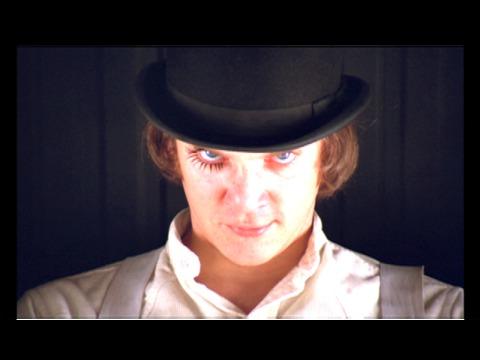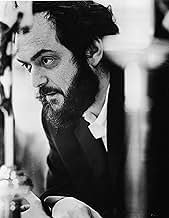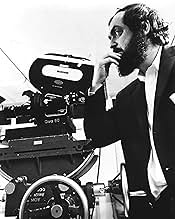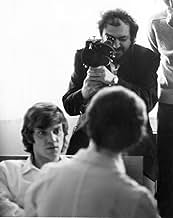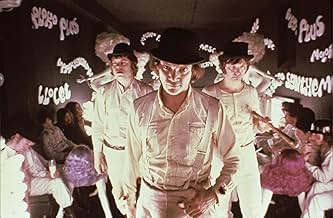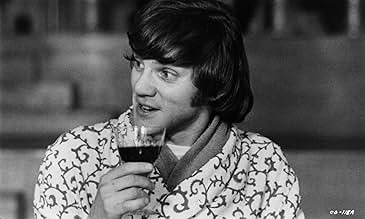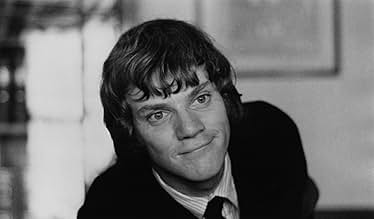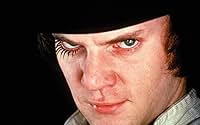- Nominated for 4 Oscars
- 12 wins & 26 nominations total
- Director
- Writers
- All cast & crew
- Production, box office & more at IMDbPro
Summary
Reviewers say 'A Clockwork Orange' is a provocative film by Stanley Kubrick, delving into free will, government control, and violence. It is lauded for its striking visuals, classical music integration, and Malcolm McDowell's performance. Critics appreciate its philosophical inquiry into conditioning and morality, though some find its graphic content unsettling. The film's Nadsat language and futuristic setting enhance its unique atmosphere. Despite varied opinions on its merit, 'A Clockwork Orange' is recognized as a significant cinematic work.
Featured reviews
A Clockwork Orange was always a film I wanted to watch but it was one of these films that I was too young to watch when it was initially released in British cinemas and then banned by Director Stanley Kubrick from being available in Britain. The ban remained until he died.
The film became infamous for its depiction of violence and sex. It overlooked the fact that despite its initial scenes of brutality and rape, in its heart it is a dark comedy set in a futuristic Dystopian Britain.
An adaptation of Anthony Burgess novel, Malcolm McDowell might be a shade too old to play the teenage delinquent Alex getting high on milk-plus which is infused with drugs and then partakes in an orgy of ultra-violence which includes beating up a vagrant, fighting with a rival gang and then speeding through the country roads where they burst into the house of a writer who gets beaten up and watches his wife get raped as Alex sings Singin in the rain.
We know Alex is still at school as he lives in his parents flat and is visited the next morning by his probation officer who is concerned about his absence from school.
However Alex's luck runs out. He falls out with his fellow gang members and when he breaks into another house, he kills a woman with a phallic sculpture, betrayed by his gang and caught by the police, he is sentenced to 14 years in jail.
The opening part of the film would had been deemed shocking in early 1970s Britain. I doubt that level of sex and savagery would had ever been seen before in a mainstream British film.
However the film becomes more of a surreal prison film once Alex ends up in jail where he joins a church group and tries to fend off advances from fellow inmates. A visiting government minister offers him a chance to take part in an experiment. Once he undertakes an experimental aversion therapy for rehabilitating criminals within two weeks the film becomes a black revenge comedy.
Once freed from prison and rehabilitated Alex finds there is no room for him in his parents home, he gets set upon by a gang of vagrants as the tramp who he beat up in the beginning recognises Alex. His old gang members are now in the police and they torture him. Worse still he stumbles into the house of the writer who he attacked and he gets his vengeance as well. Poor Alex now cannot listen to his favourite piece of Beethoven without doing harm to himself.
There is an underlying political satire of a government wanting to tackle violence in society by being draconian themselves until public opinion turns against them.
The film contains a lot of slang derived from east European languages and although I mentioned he looked rather old to play the teenage Alex, Malcolm McDowell delivers an amazing performance providing a narrative with his Yorkshire tones.
The film might put off some of its audience with its disturbing opening but settles in well after that.
The film became infamous for its depiction of violence and sex. It overlooked the fact that despite its initial scenes of brutality and rape, in its heart it is a dark comedy set in a futuristic Dystopian Britain.
An adaptation of Anthony Burgess novel, Malcolm McDowell might be a shade too old to play the teenage delinquent Alex getting high on milk-plus which is infused with drugs and then partakes in an orgy of ultra-violence which includes beating up a vagrant, fighting with a rival gang and then speeding through the country roads where they burst into the house of a writer who gets beaten up and watches his wife get raped as Alex sings Singin in the rain.
We know Alex is still at school as he lives in his parents flat and is visited the next morning by his probation officer who is concerned about his absence from school.
However Alex's luck runs out. He falls out with his fellow gang members and when he breaks into another house, he kills a woman with a phallic sculpture, betrayed by his gang and caught by the police, he is sentenced to 14 years in jail.
The opening part of the film would had been deemed shocking in early 1970s Britain. I doubt that level of sex and savagery would had ever been seen before in a mainstream British film.
However the film becomes more of a surreal prison film once Alex ends up in jail where he joins a church group and tries to fend off advances from fellow inmates. A visiting government minister offers him a chance to take part in an experiment. Once he undertakes an experimental aversion therapy for rehabilitating criminals within two weeks the film becomes a black revenge comedy.
Once freed from prison and rehabilitated Alex finds there is no room for him in his parents home, he gets set upon by a gang of vagrants as the tramp who he beat up in the beginning recognises Alex. His old gang members are now in the police and they torture him. Worse still he stumbles into the house of the writer who he attacked and he gets his vengeance as well. Poor Alex now cannot listen to his favourite piece of Beethoven without doing harm to himself.
There is an underlying political satire of a government wanting to tackle violence in society by being draconian themselves until public opinion turns against them.
The film contains a lot of slang derived from east European languages and although I mentioned he looked rather old to play the teenage Alex, Malcolm McDowell delivers an amazing performance providing a narrative with his Yorkshire tones.
The film might put off some of its audience with its disturbing opening but settles in well after that.
A Clockwork Orange is the finest film that has ever been made, in my view. Stanley Kubrick has made so many masterpieces, and is by far the best director that ever graced our world. A Clockwork Orange is simply his finest hour!
The film grabs you and glues you to your seat from start to finish. Malcolm McDowell gives us a shining example of superior acting, and the movie is as perverted as any of Kubrick's masterpieces (and then some!). It contains horrifying violence, extreme emotions, perversity and weirdness at it's very worst. It all boils down to serve you a plethora of thoughts for you to take with you and contemplate, after the film ends.
However, with all the perversity bursting out of this film, you will probably NOT like this film the first time you see it. I know I didn't. Fortunately, I gave it a second chance, and thought: Hey, it was actually not bad at all. After the third time, I was lost for words.
After the fourth time, there was little doubt in my mind, that this was the finest film ever made, and regardless of how many great masterpieces I see, A Clockwork Orange still towers above them. I'm sure you'll agree, if you give it the chance it deserves, although it may require for you to see it more than once.
The film grabs you and glues you to your seat from start to finish. Malcolm McDowell gives us a shining example of superior acting, and the movie is as perverted as any of Kubrick's masterpieces (and then some!). It contains horrifying violence, extreme emotions, perversity and weirdness at it's very worst. It all boils down to serve you a plethora of thoughts for you to take with you and contemplate, after the film ends.
However, with all the perversity bursting out of this film, you will probably NOT like this film the first time you see it. I know I didn't. Fortunately, I gave it a second chance, and thought: Hey, it was actually not bad at all. After the third time, I was lost for words.
After the fourth time, there was little doubt in my mind, that this was the finest film ever made, and regardless of how many great masterpieces I see, A Clockwork Orange still towers above them. I'm sure you'll agree, if you give it the chance it deserves, although it may require for you to see it more than once.
In a dystopian world, Alex DeLarge (Malcolm McDowell) leads his 3 followers in ultraviolence. Eventually, he is arrested for killing an old lady. In prison, he finds the violence in religion to be calming. He volunteers for an experimental treatment program. The treatment makes him ill when confronted with violence and sex. He is released and is confronted by the violence that he himself promoted.
This is almost experimental in its examination of sex and violence in society. It is an unique surreal film. The ideas behind it may be lost to people who sees this simply as an artistic violent movie. No matter how one dissects this, Malcolm McDowell's performance is beyond reproach. He shows his great acting abilities.
This is almost experimental in its examination of sex and violence in society. It is an unique surreal film. The ideas behind it may be lost to people who sees this simply as an artistic violent movie. No matter how one dissects this, Malcolm McDowell's performance is beyond reproach. He shows his great acting abilities.
10sol-
A disturbing but yet very beautiful piece of film-making, Kubrick has created the ultimate study of mind manipulation in this film. It is a protest against reform programs that take away freedom of a choice, and the message of the film in terms of paying for one's sins in all eternity is inescapable, evident to a large extent in the sardonic nature of the tale. Although set in the future, it hardly feels like it is, this being because the message of the film is overwhelmingly powerful and capable of applying to any age. The film has a number of possible hidden meanings to it a feat equaled on scale only by Kubrick's former film '2001: A Space Odyssey'. Besides for the meaning behind the film, there are still the marks of a masterpiece. Kubrick's direction is superb alongside the good photography, capturing shadows and angles needed to establish tone. The editing is excellent too, done in a flashy, brainwashing style at times to have relevance to the film. The choice of cast is again inspirational, however the film achieves the most in terms of music. Kubrick manages to use one of the earliest forms of art, classical music, and give it an unforgettable style and importance in the film. It is truly a difficult task to explain what is so great about a film such as 'A Clockwork Orange' it is maybe best explained by watching the film itself.
Anyone looking to watch A Clockwork Orange might be wanting to revisit some of Stanley Kubrik's work and might be interested in studying this film. Those who have already seen this film tend to already have strong opinions regarding this dark sci-fi movie but for me, I approached this film recently to obtain an opinion for myself and study one of the great masters of cinema.
The fact that this film was regarded as one of the most controversial films ever made (rightfully so) sparked genuine curiosity to give this flick a full viewing and while I have large issues with the film, the experience as a whole was both satisfying and a learning experience.
This story centers on "Alex" our main protagonist and his gang of hoodlums set in a not so distant, dystopian Great Britain. The beginning portion unfolds Alex's dark and twisted soul as we watch him and his gang fight, rape, and kill. When he's eventually caught, he undergoes controversial "treatment" to be cured of his dark soul.
I first appreciated the inmate concepts of this story and the type of questions the story attempted to raise to the audience. Furthermore, much of the psychological ideologies surrounding freedom, choice, good vs evil, and selfishness were extremely thought-provoking. It had a way of making me feel self-exploratory despite the character's complete inability to relate with (hopefully) any viewer.
Performances were top notch; especially from the lead: Malcom McDowell. His performance felt so authentic there's never a single moment that feels fake or forced with his dark character. As always, Stanley Kubrick directs the hell out of this. His commanding and authoritative shooting style is apparent in every frame of the picture and he does a wonderful job at sucking the viewer into this terrible world to the point of enthrallment.
While all these positives make for a great movie-going experience and when Kubrick is at the director's helm not much can go wrong, the film's biggest downfall is indeed its controversy. Disturbing subject matter in this piece is indeed vital to the essence of the story but taking off the gloves when it comes to fighting, rape, and killing (especially the rape) make this so incredibly disturbing that it's difficult to muscle through. I found that A Clockwork Orange was not only offense because of its disturbing content, it was personally offensive in so many ways. Frankly, these extremely rare and offensive movie experiences are not quite the reason I enjoy films in the first place; stories can still be thought-provoking while not morally offend and damage the viewer internally. In addition, a viewer looking to study the work of Stanley Kubrick can still experience some of cinema's greatest and transcendent experiences without feeling like their conscience has blackened.
It's understandable that not everyone feels this way; just as stated before, opinions about this film are all across the board. As time has passed however, A Clockwork Orange has stood out has one of Kubrick's finest and has been adored by die-hard fans so much its fan base has grown over the years.
The best advice to give is to see it for yourself. Much like all other Kubrick films, relying on anyone's opinion won't help one bit. Seeing it and deciding for yourself is the best course of action. That being said, despite it's strong artistic merit, I wouldn't recommend seeing it simply because of the morally offensive and sickening content that most don't appreciate. Overall, it's been the hardest one to review in a long time because it's not a simple: see it or don't see it. There's much more to this picture than that. If you do decide to see it though, be warned and well prepared. If not, that's probably just fine too.
The fact that this film was regarded as one of the most controversial films ever made (rightfully so) sparked genuine curiosity to give this flick a full viewing and while I have large issues with the film, the experience as a whole was both satisfying and a learning experience.
This story centers on "Alex" our main protagonist and his gang of hoodlums set in a not so distant, dystopian Great Britain. The beginning portion unfolds Alex's dark and twisted soul as we watch him and his gang fight, rape, and kill. When he's eventually caught, he undergoes controversial "treatment" to be cured of his dark soul.
I first appreciated the inmate concepts of this story and the type of questions the story attempted to raise to the audience. Furthermore, much of the psychological ideologies surrounding freedom, choice, good vs evil, and selfishness were extremely thought-provoking. It had a way of making me feel self-exploratory despite the character's complete inability to relate with (hopefully) any viewer.
Performances were top notch; especially from the lead: Malcom McDowell. His performance felt so authentic there's never a single moment that feels fake or forced with his dark character. As always, Stanley Kubrick directs the hell out of this. His commanding and authoritative shooting style is apparent in every frame of the picture and he does a wonderful job at sucking the viewer into this terrible world to the point of enthrallment.
While all these positives make for a great movie-going experience and when Kubrick is at the director's helm not much can go wrong, the film's biggest downfall is indeed its controversy. Disturbing subject matter in this piece is indeed vital to the essence of the story but taking off the gloves when it comes to fighting, rape, and killing (especially the rape) make this so incredibly disturbing that it's difficult to muscle through. I found that A Clockwork Orange was not only offense because of its disturbing content, it was personally offensive in so many ways. Frankly, these extremely rare and offensive movie experiences are not quite the reason I enjoy films in the first place; stories can still be thought-provoking while not morally offend and damage the viewer internally. In addition, a viewer looking to study the work of Stanley Kubrick can still experience some of cinema's greatest and transcendent experiences without feeling like their conscience has blackened.
It's understandable that not everyone feels this way; just as stated before, opinions about this film are all across the board. As time has passed however, A Clockwork Orange has stood out has one of Kubrick's finest and has been adored by die-hard fans so much its fan base has grown over the years.
The best advice to give is to see it for yourself. Much like all other Kubrick films, relying on anyone's opinion won't help one bit. Seeing it and deciding for yourself is the best course of action. That being said, despite it's strong artistic merit, I wouldn't recommend seeing it simply because of the morally offensive and sickening content that most don't appreciate. Overall, it's been the hardest one to review in a long time because it's not a simple: see it or don't see it. There's much more to this picture than that. If you do decide to see it though, be warned and well prepared. If not, that's probably just fine too.
Director's Trademarks: A Guide to Stanley Kubrick's Films
Director's Trademarks: A Guide to Stanley Kubrick's Films
2001: A Space Odyssey and Eyes Wide Shut are just the beginning of Stanley Kubrick's legacy. Are you up to speed on the film icon's style?
Did you know
- TriviaMalcolm McDowell's eyes were anesthetized for the torture scenes so that he would film for periods of time without too much discomfort. Nevertheless his corneas got repeatedly scratched by the metal lid locks.
- GoofsMany of the continuity errors are not in fact errors. Stanley Kubrick purposely included many continuity errors as a way of creating a feeling of disorientation for the audience. That is why people's positions change, props are reorganized, and hats (and other articles of clothing) appear and disappear.
- Crazy creditsThere are no opening credits after the title, which is followed by the opening shot of Alex the Droog. Although it is now commonplace for major films to not have opening credits, in 1971 it was considered rather unusual and was considered a trademark of director Stanley Kubrick.
- Alternate versionsIn 1973, a new version of "A Clockwork Orange" was released to theaters with an MPAA rating of "R", replacing the previous "X". The new version contained approximately 31 seconds of replacement, less lascivious footage for two scenes: the high speed (2 fps) orgy in Alex's bedroom, and the Ludovico rape scene. The bedroom scene was made more comical by having one of the girls fall off the bed and Alex joins her down there. The Ludovico rape scene was altered in that the scenes with the first two droogs was from the side and waist-up, so it is less explicit. The third droog was removed completely and replaced with a close-up of one of the doctor's face as they are watching Alex's treatment.
- ConnectionsEdited from Le triomphe de la volonté (1935)
- SoundtracksSymphony No.9 in D Minor, Opus 125 Choral: II. Scherzo. Molto vivace
Written by Ludwig van Beethoven
Recorded by Deutsche Grammophon Gesellschaft
- How long is A Clockwork Orange?Powered by Alexa
- why is it that even though the film is set in the future, it still seems to have a distinct 1970's look and feel to it.
- Why did Dim & Georgie turn on Alex?
- What is 'A Clockwork Orange' about?
Details
- Release date
- Countries of origin
- Language
- Also known as
- Naranja mecánica
- Filming locations
- Binsey Walk, Southmere Lake, Thamesmead South, London, England, UK(Alex puts Dim in water - houses demolished)
- Production companies
- See more company credits at IMDbPro
Box office
- Budget
- $2,200,000 (estimated)
- Gross US & Canada
- $26,617,553
- Gross worldwide
- $27,034,174
- Runtime2 hours 16 minutes
- Color
- Sound mix
- Aspect ratio
- 1.66 : 1
Contribute to this page
Suggest an edit or add missing content


